Why Choose .NET: Pros and Cons of .NET Development
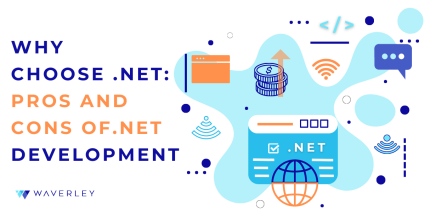
Contents
In today’s dynamic software development environment, a project’s success largely depends on the choice of programming frameworks. Businesses need to approach the choice of tech stack with utmost attention, taking into account such factors as the scope of the product, complexity of its functionality, potential number of users, budget constraints, the size and structure of the engineering team, etc. The.NET programming language has gained popularity in addition to the many alternatives that may be offered, allowing programmers to make future-proof and scalable projects and apps for a number of platforms.
In this article we will start with a short explanation of what .NET is as well as a short introduction of the .NET framework ecosystem. However, our main focus is the pros and cons of .NET. Therefore, you will learn what this framework is good for, when to use it and some examples of projects based on .NET and Microsoft stack.
What is .NET?
Microsoft’s .NET framework is a free, open-source, cross-platform tool used to create a range of programs. On a variety of hardware and operating systems, it offers a platform for the development and execution of programs. By offering a consistent and standardized framework, .NET’s primary goal is to simplify and accelerate software development.
.NET consists of a series of components, including the following:
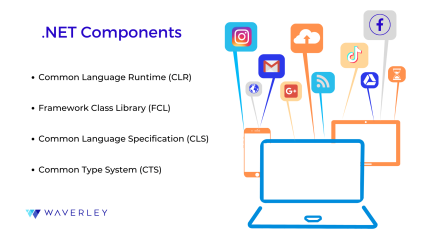
- Common Language Runtime (CLR)
.NET’s CLR serves as an execution environment which controls how code is executed offering functions like memory management and exception handling. - Framework Class Library (FCL)
In the .NET framework, Framework Class Library offers a variety of APIs and forms of common functionality. It gives you access to a collection of pre-built classes, interfaces and value types that span a wide variety of capabilities like file I/O networking, cryptography and more. - Common Language Specification (CLS)
Microsoft has a set of guidelines called CLS for.NET languages that promote language characteristics and enable interoperability. You will be able to ensure different programming languages targeting the CLR to work together seamlessly. - Common Type System (CTS)
With the CTS, you may create a framework that makes cross-language integration possible. This means that by using the CTS component, .NET may offer you a standardized method for handling types across the whole framework.
Moreover, .NET is a powerful, versatile developer platform that offers a series of cross-platform capabilities that are compatible with a series such as the following:
| CROSS-PLATFORM CAPABILITIES | |
|---|---|
| Cross-platform Compatibility | Native codes compatible with operating systems. |
| .NET Multi-platform App UI | Also known as .NET MAUI uses a single C# codebase |
| Runtime and Libraries | Platform-independent runtimes and libraries are offered by .NET. |
| .NET Standard | .NET APIs available on all .NET implementations |
The .NET Ecosystem
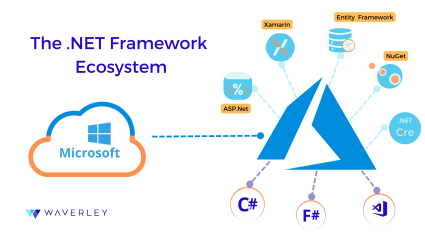
The .NET ecosystem is a robust and expanding platform for developers that offers a vast number of app types. It is made up of a variety of tools, programming languages, such as C#, F# and Visual Basic, libraries and most importantly a series of frameworks and versions such as .NET Core, which will be explained in more detail, .NET 7, and much more.
The .NET framework has undergone a number of updates that have added new features and enhanced the existing ones. In the following list, we will briefly explain some of the main components that make up its ecosystem. So what are the .NET frameworks? Let’s take a look at the following:
NuGet
Our developers may locate, install, and manage third-party libraries and frameworks using the NuGet manager as needed. Consequently, the abundance of packages makes it simpler to integrate external requirements into your program.
ASP.NET
Since ASP.NET adds a variety of tools and frameworks that assist in creating dynamic websites, developers utilize it to extend the capabilities of the.NET platform. It performs admirably for back-end code created in languages like C#, F#, and Visual Basic.
Entity Framework
Also known as object-relational mapping (ORM), Entity Framework gives developers accessibility to databases for .NET apps. Therefore, it offers automatic mapping between object-oriented programming models and database schemas.
Xamarin
Looking to build apps for iOS, Android, and Windows while using a shared codebase? Developers leverage Xamarin to build scalable cross-platform applications that provide a native-like look and feel and excellent performance.
.NET Core
.Net Core is an updated version of .NET which is compatible with the .NET Framework. .NET Core is that it provides cross-platform functionality and open-source implementation. You can use it to create software for Linux, windows, and MacOS operating systems.
These are only a few examples of the additional components and programs that .NET can employ. There are numerous libraries, frameworks, and community-driven projects available to meet different development needs. More specifically, the.NET ecosystem’s capabilities are increased by the components and tools in it, giving developers more features and functionalities.
For instance, it is simpler to design dynamic and interactive web apps with web development frameworks like ASP.NET and ASP.NET Core. The Entity Framework also makes it simpler for developers to deal with data using object-oriented concepts by providing an ORM framework. While Xamarin allows for cross-platform mobile app development using .NET, WinForms provides frameworks for building desktop applications.
Why Choose .NET: Pros and Cons
There are a variety of reasons to use dot net (.NET). Yet, there are also a number of drawbacks that come with this framework. Therefore, we will delve deeper into each of them to help you understand it better and so you can make a more data-driven decision. Make sure to carefully read the next section as it contains pros and cons of dot net.
.NET Advantages
So, why should you choose .NET (dot net)? Let’s first dive into the .NET (dot net) advantages one by one.
1. Rich Development Environment
One of the key benefits of .NET (dot net) is its comprehensive development environment, which gives programmers access to a variety of features and tools. For scalable applications, this framework provides a variety of language support, package management, debugging, and testing capabilities.
2. Language Versatility
One of the other advantages of using .NET framework is language versatility. .NET offers versatility to developers, so they can select the tools that best meet their requirements and needs.
2. Rapid Application Development
In the realm of development, timing is crucial, which is why the use of .NET is ideal. The extensive set of tools provided by Microsoft, such as Visual Studio enhances productivity and accelerates app development.
3. Cross-Platform Development
Over time .NET has evolved and different versions were released and, as a result, cross-platform apps created with the Microsoft stack have become even more compatible with a variety of devices and operating systems.. Developers are able to build apps that run on different operating systems, which enables greater flexibility when targeting several platforms.
4. Scalability and Performance
You can scale and improve your application’s performance by using .NET’s Common Language Runtime (CLR) and Just-in-time compilation. It converts intermediate language (IL) code to native machine code at runtime.
5. Rich Resources and Libraries
A wide array of libraries is another important item in the list of the pros of .NET (dot net) development. The benefit of using .NET is that you can take advantage of its many frameworks and libraries such as ASP.NET or Xamarin which are used for web and cross-platform mobile app development.
6. Enhanced Security and Reliability
.NET has a number of security features to help shield apps against any vulnerabilities. With pre-built support for authentication, encryption and more you can build pretty secure applications.
7. Flexible Deployment and Simplified Maintenance
The .NET-based apps you create can be installed on a variety of hardware and operating systems. Our team uses .NET technologies, which provide developers with a range of deployment choices across Windows, macOS, and Linux operating systems.
8. Universal .NET Standard
Once again, out of the many advantages of dot net (.NET) development the universal .NET standard is among the most important ones. Your business will benefit from the development of adaptable and scalable apps, reaching a wider market, and strengthening the competitive advantage thanks to Universal.NET.
9. Thriving Popularity and Supportive Community
A substantial and active development community exists for .NET. With a variety of tools, including forums, tutorials, open-source projects, and more, developers assist one another. Developers collaborate to address issues, and share knowledge and toolsets.
10. Active Microsoft Support
In conjunction with other Microsoft goods and services, .NET is a Microsoft technology. Not to mention, it interacts with Azure cloud services. This involves working with SQL Server databases, among other things. Development and deployment processes are made more efficient by this interaction.
11. Effective Caching System
Cashing is when data is stored in an intermediate layer to speed up subsequent data retrievals. Therefore, the .NET caching system provides developers with the ability to build cache items with precise durations and govern expiration policies.
12. Automatic Monitoring in ASP.NET
This is similar to ongoing support for your application. With .NET and the help of the ASP.NET framework you can benefit from built-in tools and features that allows developers to monitor the apps performance, health and other essential metrics.
13. Seamless Integration
You can integrate other Microsoft services and products such as the Azure cloud platform, SQL server. Additionally, you can work with other programming languages resulting in seamless integration with existing systems and third-party libraries.
.NET Disadvantages
1. Learning Curve
.NET is extensive and no doubt in mind that it is a major advantage. Yet, its broadness may bring some learning challenges for newbies. Its large set of tools and technologies makes the platform a bit more complex, which means new developers have to invest time and effort mastering it.
2. Vendor Lock-in
In the context of .NET, vendor lock-in is great to streamline development and achieve greater integration by using stack from one single vendor. However, it also entails certain risks, such as lack of choice, potential reduction in quality, changes to product offerings, or price increases imposed by the vendor.
2. Stability Issues for New Releases
Microsoft occasionally updates and presents new features that may present inadequate support and documentation. Therefore, it could become frustrating for developers since constant changes won’t allow them to stay up-to-date.
3. Development Environment Limitations
Even after growing to support a variety of platforms and operating systems, the foundation of .NET is in Windows-based environments. Therefore, while creating cross-platform programs or aiming for any non-Windows platforms, there can be some limitations or challenges.
4. Memory Leaks
Memory leaks in .NET occur when an application retains references to objects it no longer needs, hindering the garbage collector from reclaiming memory.
5. Cost of Licensing
Thanks to .NET Core currently the .NET framework is a free open-source platform. Yet, some .NET related tools and components could require additional licensing costs. If you decide to invest in developing in the Microsoft environment, you may need to pay extra licensing fees for the Windows server or other Microsoft products.
| .NET PROS | .NET CONS |
|---|---|
| Rich Development Environment | Learning Curve |
| Language Versatility | Vendor Lock-in |
| Rapid Application Development | Stability Issues for New Releases |
| Cross-platform Development | Development Environment Limitations |
| Scalability and Performance | Memory Leaks |
| Rich Resources and Libraries | Cost of Licensing |
| Enhanced Security and Reliability | |
| Flexible Deployment and Simplified Maintenance | |
| Universal .NET Standard | |
| Thriving Popularity and Supportive Community | |
| Active Microsoft Support | |
| Effective Caching System | |
| Automatic Monitoring in ASP.NET | |
| Seamless Integration |
When to Use .NET
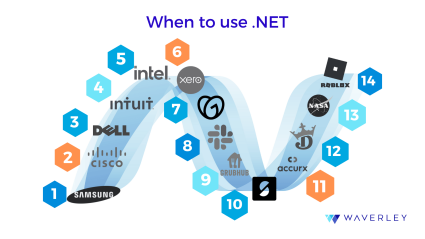
.NET provides a strong basis for creating cloud-based solutions as well as desktop, mobile, and web applications. This next section aims to describe the uses of the .NET framework.
Enterprise-level applications with complex business logic
Do you have application ideas with complex business logic? Enterprise-level apps with intricate business logic are a good fit for .NET. .NET offers a variety of tools, libraries and technologies to help with the creation of complex apps.
.Net support is great for complex business applications because it has a strong language network. Some of the languages that developers use are .C#, F# and VB.NET which allows them to choose what they are comfortable with.
Web applications requiring high performance and scalability
Web apps that need to attain high levels of performance, scalability and reliability should definitely consider using .NET. It can give you the tools you need to handle large workloads, scale successfully across numerous servers or virtual machines, and ensure a strong and stable system when your online application has such needs.
Let’s take a moment to remember the advantages of .NET and Microsoft Stack in general. Microsoft’s wide range of tools and technologies provide opportunities for scalability and enhanced performance. Well, the use of microservices allows distributing the workload across multiple servers or virtual machines. This enables applications built with .NET to effectively handle heavy loads and expand horizontally by spreading the workload across multiple servers or virtual machines.
When developers create .NET web applications there are a few things they must consider:
- Managing complexity and dependencies
- Ensuring scalability without sacrificing performance
- Handling heavy traffic
Projects that can leverage the extensive library of .NET frameworks and components
GenerWith .NET, your company can leverage a wide range of .NET frameworks and components. We have mentioned that .NET has a rich environment since it has different frameworks, technologies and tools.
The broad collection of .NET frameworks offers a wide range of options for creating various project kinds. The following are only a few instances of initiatives that can benefit from the abundance of these frameworks.
- Web, Desk, Mobile apps
Using the ASP.NET AND ASP.NET Core frameworks, you can create dependable and expandable online apps. Using the full UI features that WPF or Windows Forms provide, you may also design high-performance desktop applications. Furthermore, you may use Xamarin to create cross-platform mobile apps for iOS or Android. - Gaming projects
You can leverage the strengthened power of the .NET libraries and frameworks for asset management, AI, and physics simulations. All of these will help the development and design of games. - Machine Learning
The ML.NET framework is an open-source and cross-platform ML framework. It has many components like data processing, model training and other prediction capabilities that will make it easier for ML project ideas. - Internet of Things
Last but not least, you can build IoT solutions using the .NET Micro framework, which is essentially used for devices with few resources. So, you can use an abundance of libraries for data processing, device control, and communication protocols.
Well-known software developed on .NET
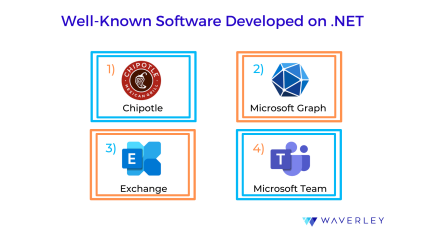
Up to this point, we know that Microsoft’s .NET has completely changed the software development industry. This framework is cross-platform compatible and has a solid architecture. This software, which makes use of the .NET framework, has revolutionized the way businesses run by offering effective solutions and enabling developers to create cutting-edge apps. Which apps, for example? What are the .NET applications that are making the .NET history?
Chipotle
Fast-casual eatery Chipotle Mexican Grill specializes in food with Mexican influences. It features three customer-facing websites: one for ordering, one for catering, and one for general information. The most current release was a few years ago, but fresh versions have recently been made available. Chipotle’s ordering system was developed using.NET, more specifically.NET Core, Visual Studio Code, and Azure.
Microsoft Graph
Microsoft was also built on .NET (dotnet). Microsoft offers a series of SDKs which support a number of programming languages, including C#, which is based on the .Net framework, and they come with a service library and a core library. Additionally, the CLI or the Package Manager Console in Visual Studio are both capable of installing the Microsoft .NET SDK.
Exchange
With the help of the Exchange Web Services, programmers can create distinctive apps to manage mailbox data. Although it is possible to access EWS using the.NET Framework and the EWS Managed API, this does not imply that the Exchange program is built using.NET. It is not an accurate representation of Exchange’s underlying technical stack to use.NET to connect to Exchange via EWS.
Microsoft Teams
Multiple scenarios are powered by the internal service in Microsoft Teams’ “MiddleTier”. One of the major services, it has more than 700 APIs and is maintained by 10 or more Microsoft Teams. Additionally, with.NET Core 3.1, apps have functional and performance parity but are now solely running on.NET Core 3.1 in production, with plans to switch to .NET 6 next.
Our Experience with .NET
So why do we use .NET (dot net) at Waverley? Our engineering team loves using .NET to build complex and large-scale enterprise products for our clients. Waverley is a global .NET development firm that offers software solutions and products both from scratch and on top of your pre-existing software. We have .NET development services with a team that is powerful and knowledgeable in Microsoft Stack.
Therefore, if you would like to build a .NET-based app but lack resources or need a consultation on where to start – we’re happy to take on new projects anytime. We have an Eastern Europe base, but we also have a team of dedicated .NET developers in Latin America, being one of the best .NET outsourcing companies in Latin America.
We have successfully used .NET’s Framework’s strength and adaptability as a team to provide our clients with reliable, scalable and effective solutions.
We have a vast amount of success stories where we have leveraged the .NET tools. One of our earliest projects includes software support and maintenance services for Palo Colorado using .NET’s ASP.NET Forms, Web API and MSSQL Server. We have also worked on the development native mobile applications for customs papers management and mobile social platforms. Moreover, using the .NET framework we helped with the creation of Addus, a cross-platform application for homecare services. To find out more about our .NET experience, please contact one of our Sales representatives.
Why .NET: Summary
So, why .NET? In short, if you are looking to enhance the operability of your apps, you may consider using the .NET Framework. It offers a number of benefits for businesses and holds a large collection of libraries, tools and overall community support. Because of its features, developers are able to build not only intuitive but reliable applications.
Moreover, the release of different versions of .NET has increased its cross-platform capabilities as well as its adaptability for seamless integration. Overall, if you choose to work with .NET you can develop a strong foundation for a variety of apps while gaining access to its robust ecosystem and cross-platform functionality.
We, at Waverley, have vast .NET experience and can provide you with excellent solutions and services, including embedded software engineering. So be sure to get in touch with us. You can start your development process road mapping by completing the form below, and we will quickly get in touch with you.
FAQ
Is .NET only for Windows-based applications?
No, .NET is not exclusively designed for Windows applications. While initially developed by Microsoft for Windows, it has evolved and now enables cross-platform development. Over the years, .NET has expanded its capabilities and supports the creation of applications that can run on multiple platforms.
Which programming languages can I use with .NET?
.NET supports different programming languages, allowing developers to select the language that best satisfies their needs and preferences. The following are a few of the well-known languages that can be used by .NET:
- C#
- F#
- С++
- Visual Basic
- IronPython
Is .NET suitable for small-scale projects?
Absolutely, .NET is appropriate for the development of applications of various sizes, from small-scale projects to big enterprise-level systems. The .NET framework and its companion tools offer a reliable and scalable platform.
Can I integrate .NET applications with existing systems?
Yes, it is possible to integrate .NET applications with existing systems. The .NET framework supports compatibility with various systems and languages and provides a variety of integration options. You can utilize technologies like message queues, database connectors, and web services to provide seamless integration with existing systems.




